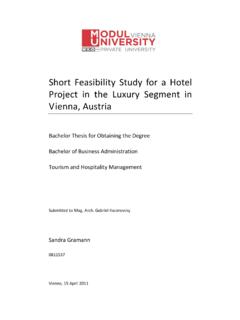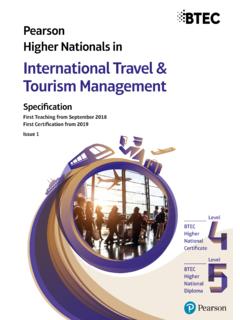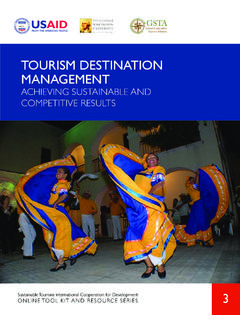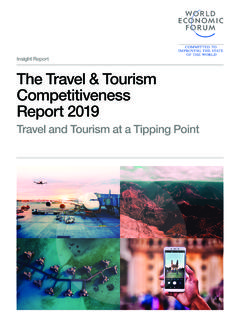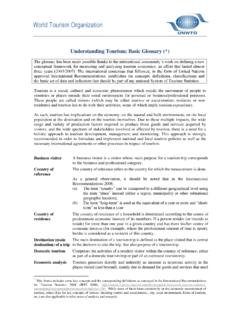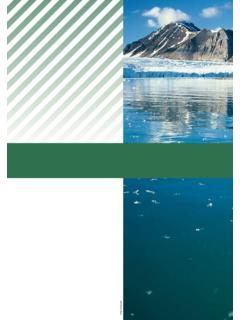Transcription of Terrorist Attacks US International Tourism Development
1 Impact of 9/11 Terrorist Attacks on US and International Tourism Development Bachelor Thesis to Obtain a Bachelor's Degree in Business Administration Tourism and Hospitality Management Submitted to Karin Glaser Veronika Bysyuk ID 0711545. Vienna, 24 May 2010. Declaration of Authorship I declare that this dissertation is my own unaided work. I have not included any material or data from other authors or sources, which are not acknowledged and identified in the prescribed manner. I have read the section in the exam regulations on plagiarism and understand that such offences may lead the Examinations Board to withhold or withdraw the award of Bachelor of Business Administration.
2 _____ _____. Date Signature 2. ABSTRACT. The purpose of this thesis is to research the impact of the 11 September 2001. Terrorist Attacks on the United States and the US and global Tourism industry, to describe major problems, consequences and lessons learned, and analyze the response of the US and global Tourism industry to these challenges in terms of the Development of future concepts for a sustainable Tourism industry. In particular, the impact analysis on the US Tourism industry includes a detailed review involving the statistical implications for the whole industry's major sectors such as air travel , conventional leisure Tourism , and the hotel and restaurant industries.
3 Economic, security and legislation measures undertaken by the United States government and other official authorities and Tourism institutions to combat the consequences of the crisis and help the domestic Tourism economy to recover from the crisis are analyzed in detail. This thesis also reviews the real impact of these measures on the crisis recovery process in the US and on an International level. 3. Table of contents: Introduction ..5. 1. Tourism and Terrorism Relationship ..7. Influence of terrorism over History of Terrorist Attacks in USA ..9. 2. 9/11 Terrorist attack and its immediate impact on Tourism ..10. 9/11 Terrorist attack ..10. First shock and immediate economic consequences.
4 11. US Tourism industry's immediate losses ..12. 3. United States response to economic problems caused by 9/11 ..14. Air Transportation Safety and System Stabilization Act (ATSSSA)..14. Six-Point Recovery Plan ..15. Legislation and security measures implemented after 9/11 ..16. US security measures for air transportation ..17. US visa policy and application restrictions after 9/11 ..19. US Tourism industry demands stimulating 4. Close-up review of impact of 9/11 Attacks on US Tourism 9/11 implications on US air travel 9/11 implications on US hotel industry ..22. Impact on US restaurant industry ..25. New York and other US USA-Canada and US-Mexico Tourism relations.
5 29. 5. Recovery effects of anti-crisis measures ..29. 6. Implications of 9/11 Attacks on International Tourism industry and recovery issues ..32. 9/11 Attacks implications on Muslim countries and their Tourism industries ..32. International air travel industry ..36. Global crisis recovery ..36. Effective measures for combating crisis ..37. Conclusion ..38. References ..41. Introduction The Tourism industry has been one of the most rapidly expanding industries in modern business over the last two decades. Nowadays, people travel much more frequently than ever before. In 2005 the World Trade Organization (WTO) reported the following industry statistics (WTO, 2005): - 338 million are people employed in the industry as a whole - The industry represents of Total World Product - 800 million tourists are catered for annually - trillion US dollars business value - 800 billion US dollars of total revenue - annual growth rate The variety of services that Tourism institutions offer, as well as the number of travel destinations are growing from year to year in hyper proportions.
6 The Tourism industry's share in the national economies of various countries throughout the world is quite significant. Some countries such as the Maldives are totally dependant on Tourism , having of their GDP in Tourism services industry (CIA World Factbook, 2010). However, one should not forget that apart from the promising Development dynamics in the Tourism industry, this type of business remains fragile and is exposed to risk factors such as political instability/conflicts, natural disasters, war, acts of terrorism, etc. The impact of these threats on Tourism is substantial. Such happenings immediately lead to a downturn in the national Tourism industry of the country affected.
7 One needs to point out major post-crisis event issues which need to be identified: the severity and duration of the downturn, as well as a proper recovery policy implementation (Blake and Sinclair, 2002). On a short-term scale it will result in a drop-down microeconomic index. In the long run it will negatively affect macroeconomic values. That is why national governments (especially in those countries where Tourism plays a dominant role in national economies) are trying to develop corresponding anti-crisis policies and security measures in order to be well prepared to rapidly overcome the possible consequences of such incidents. An explicit example of the long-term difficulties experienced in the tourist industry is the Basks organization's Terrorist activities in Spain.
8 According to official statistics, 5. this country loses around 10% in GDP every year due to this problem and the situation there is far from any foreseeable solution (Blake and Sinclair, 2002). Needless to say, terrorism today is one of the most dangerous threats for the Tourism industry as a whole. Generally, terrorism can be defined as the premeditated use or threat of use of violence by individuals or sub-national groups to obtain political or social objectives (Blake and Sinclair, 2002). The reason for that is very simple and frightening at the same time. The success of a politically motivated Terrorist action can be measured by the long-term effects caused by the action and the media exposure (Al-Hamarneh, 2005).
9 Among the threats mentioned above, terrorism is a threat whose aim is directed at stressing negative attention. Comparing acts of terror to other tragic happenings such as natural disasters, epidemics, etc. which take or threaten human lives and harm economic Development , one can observe a very important and distinct factor the rationality of this happening. In other words, an act of terror is not just a tragic event which Attacks civil liberties, stresses the public, generates mass media attention and harms economic and social prosperity, but also one which can be potentially repeated in the same area or region any time in the coming future (Korolev, 2007).
10 This factor has a mid and long-term reach, discouraging potential tourists from selecting the region as a travel destination because to them the perceived risk goes far beyond the core of the problem and creates a bad image. Generally, an image can be described as a sum of beliefs and impressions and perceptions that people hold of a certain event (Soenmez, 1998). If a certain negative set of impressions and beliefs are being formed it is extremely difficult to re-establish favorable perceptions. It may lead to political and economic instability in the region/country, especially when such regions are heavily dependant on the Tourism sector. This thesis researches the impact of the 11 September 2001 Terrorist attack on the United States and the US and global Tourism industry, describes major problems, consequences and lessons learned, and analyzes the US and global Tourism industry responses to this challenge in terms of the Development of future concepts for a sustainable Tourism industry.
